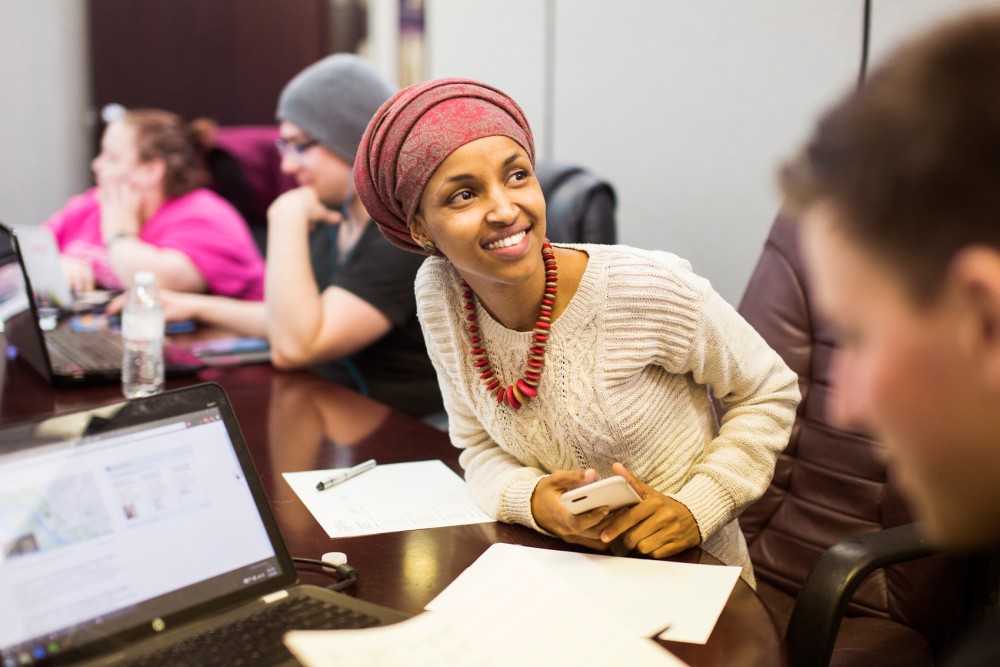Political activist Ilhan Omar talks a lot about building.
She describes herself as a “bridge-builder” in her community work and emphasizes the need to build better societies for future generations.
But her sense of value for constructing a sense of home may come from seeing her first one violently dismantled.
Omar, 32, was born and lived in Somalia until civil war tore the country apart. Her family fled to Kenya, where they lived in a refugee camp for four years until moving to Minneapolis when she was in the sixth grade.
Now, Omar hopes to be elected to the Minnesota House of Representatives in District 60B. But Omar, who is seeking the DFL’s nomination, faces longtime Rep. Phyllis Kahn, DFL-Minneapolis, who is tied for the most number of years served in the House, and Mohamud Noor to win the DFL’s nomination for the general election. The party’s endorsement will be handed out at the district’s convention on Saturday.
“I’m looking forward to revitalizing our democracy and bringing my immigrant optimism and being a young person, being that visible leader who is enthusiastic,” Omar said.
“I’m not saying that Representative Kahn sleeps on the job, but there is a lot that needs to get done and that isn’t getting done.”
If elected, she would be the first East African, Muslim woman elected to office. Noor, who previously ran against Kahn in 2014, is also Somali-American.
Minneapolis is home to the largest Somali community in the country, according to a 2010 survey from the U.S. Census Bureau.
Before she declared her candidacy, she was a senior policy aide to Minneapolis Ward 12 Council member Andrew Johnson.
“I viewed it as a limited-time opportunity for me and for Ward 12 to have her talent and her drive working on our behalf because I knew that it was only inevitable that she would go on to higher places because she is so talented and such a leader,” Johnson said. “She has such a deep knowledge on issues and willingness to learn and to listen.
You couldn’t be better represented than having her at the Legislature.”
One of the Omar campaign’s major focuses is the affordability and accessibility of higher education. If elected, she would represent a district with a large student population;
The University of Minnesota’s East and West Bank campuses and surrounding area are located in the district.
In a YouTube video posted on Omar’s campaign Facebook page, University Undergraduate Student Body President Joelle Stangler, who has publically supported Omar, said the candidate would represent students better than the district’s current representative, Kahn.
“I have seen a lack of leadership, a lack of engagement and a really big disconnect between our representation in the state Legislature and students,” Stangler said in the video. “I don’t feel that way at all when I talk to Ilhan. I feel like we are being listened to. I feel like it’s a sincere interest in our interests.”
Omar said her educational goals also include making public universities free, providing working families access to free preschool and extended child care subsidies and increasing the presence of counselors and diverse teachers in schools.
“I realize that we need to start having the tough conversations about creating programs where we are lessening the burden of college debt on those who already have it,” she said, “and making sure that we are putting programs into motion so that others coming into the college system don’t have to have that burden.”
And since Omar is a working parent, she knows firsthand the difficulties many Minnesotan families encounter, said Conrad Zbikowski, operations director for the Omar campaign.
“She knows the struggles that families are having right now in the state,” he said. “We’re doing better than we were a couple years ago, but we’re still having struggles.”
Not only is Omar a working parent, said Noah Shavit-Lonstein, political co-director for Omar’s campaign, but she is also still paying off student debt.
“She knows what kind of a struggle that is,” he said.
Additional issues of her campaign range from tackling mass incarceration to restorative justice, restoration of voting rights for ex-felons, divesting from fossil fuels while investing in renewable energy and closing the opportunity and disparity gaps facing minority communities across the state, which are among the worst in the nation.
“These are issues that are really core to what the progressives in our district care about, and they’re core to what the people of our state care about,” Omar said.
Due to a lack of representation in politics of both women and people of color, Omar’s intersectional identity makes her campaign especially significant, said Felicia Philibert, president of the University student group Women for Political Change.
“I think it’s a really great time for women of color to get involved in government especially,” she said, “because it’s definitely a voice that’s not heard as prevalently.”
Omar said the lack of intersectional voices — like hers — in politics means that many of the issues unique to them are rarely addressed.
Additionally, even when a candidate has multiple, diverse identities, that candidate is pressured to emphasize only one of them, she said.
“It’s often not really about a particular identity,” she said. “I don’t get to choose which identity that I worry about more and fight for more.”







